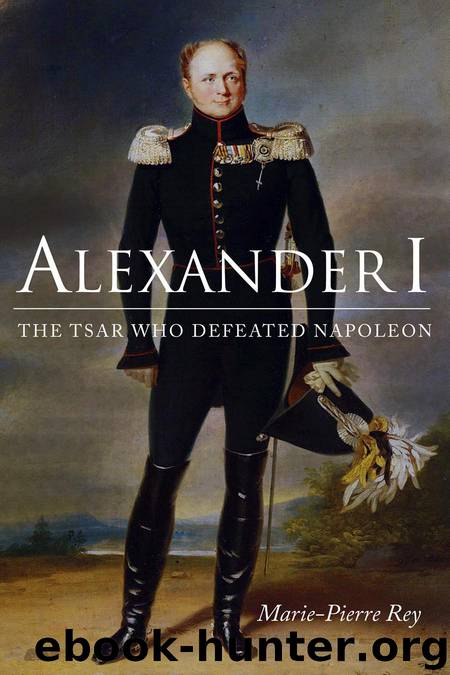Alexander I- the Tsar Who Defeated Napoleon by Marie-Pierre Rey

Author:Marie-Pierre Rey
Language: eng
Format: mobi
ISBN: 9781609090654
Publisher: Northern Illinois University Press
Published: 2012-11-15T05:00:00+00:00
CHAPTER 11
1812
The Duel of the Emperors
The huge bibliography devoted to the Napoleonic campaigns and in particular to the war of 1812 makes one dizzy: no fewer than 5,000 books and almost 10,000 articles were published in Russian between 1812 and 1912,1 with almost as many in all the other European languages! While in the course of the twentieth century Soviet historians seemed to slow down and turn away from this field,2 the West has taken over, through research centers and societies of Napoleonic studies. This speaks to the enduring fascination with the subject of the French invasion of Russia. Here I cannot relate in detail the history of the campaign—a whole volume would not suffice, and other historians have done so with talent3—but rather I want to give an account of the major phases, before turning to the analyses, perceptions, and behavior of Alexander at the time of the cataclysm that shook the Russian Empire.
The Campaign of 1812
In the merciless duel4 in which Napoleon and Alexander were engaged in 1812, everything opposed them to each other: rhetoric, ideology, objectives, means, and strategy. Apart from the terrible shock of throwing 600,000 men into combat, there was a confrontation between two wills, two consciences, two conceptions of power, and two world views. Often concerned not to ruin the image of Napoleon as a genius at strategy, French historians have had a tendency to incriminate the coldness and harshness of the climate and the extraordinary valor of the Russian troops rather than to pinpoint Napoleon’s errors.5 But if, in fact, “the general winter” did not facilitate the invader’s task, it was more the errors of judgment committed by the French emperor—his excessiveness and his conviction that victory would be swift, which pushed him to neglect the climatic obstacles as well as distances—and his inability to understand the mind and personality of his adversary and to discern his psychology, that caused his failure.
At the head of the Grande Armée, Napoleon decided to invade the Russian Empire in June 1812 because he suspected the Russian army was at the point of moving onto the offensive (based on the scope of the forces disposed along the western frontier). The French emperor was counting on a rapid war, which he expected to win thanks to one decisive battle. After Austerlitz and Friedland, he intended to inscribe into the collective imagination yet another stunning victory that would force Alexander I to capitulate, push him back east once and for all, and allow France to have a free hand in Europe. Yet, those close to Napoleon had not stopped warning him about this reckless plan; Cambacérès, Fouché, Prince Jerome, and Caulaincourt had all tried to dissuade him from undertaking a campaign that appeared foolhardy—one that presupposed a long stretching of the communications lines—as well as illegitimate. But Napoleon would not listen: he wanted at all costs to conduct this campaign to end Russian resistance and to marginalize England for good.
While at the start of the conflict the tsar had
Download
This site does not store any files on its server. We only index and link to content provided by other sites. Please contact the content providers to delete copyright contents if any and email us, we'll remove relevant links or contents immediately.
| American Revolution | Civil War |
| US Presidents |
Fanny Burney by Claire Harman(26594)
Empire of the Sikhs by Patwant Singh(23070)
Out of India by Michael Foss(16848)
Leonardo da Vinci by Walter Isaacson(13315)
Small Great Things by Jodi Picoult(7121)
The Six Wives Of Henry VIII (WOMEN IN HISTORY) by Fraser Antonia(5496)
The Wind in My Hair by Masih Alinejad(5091)
A Higher Loyalty: Truth, Lies, and Leadership by James Comey(4951)
The Crown by Robert Lacey(4806)
The Lonely City by Olivia Laing(4798)
Millionaire: The Philanderer, Gambler, and Duelist Who Invented Modern Finance by Janet Gleeson(4464)
The Iron Duke by The Iron Duke(4349)
Papillon (English) by Henri Charrière(4261)
Sticky Fingers by Joe Hagan(4188)
Joan of Arc by Mary Gordon(4099)
Alive: The Story of the Andes Survivors by Piers Paul Read(4018)
Stalin by Stephen Kotkin(3956)
Aleister Crowley: The Biography by Tobias Churton(3629)
Ants Among Elephants by Sujatha Gidla(3459)
